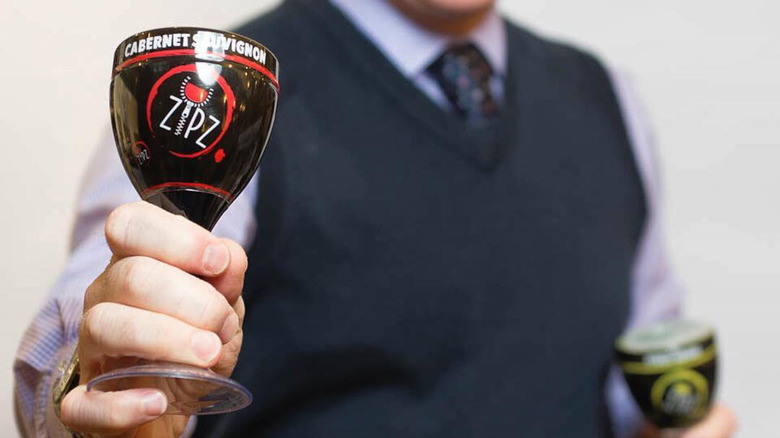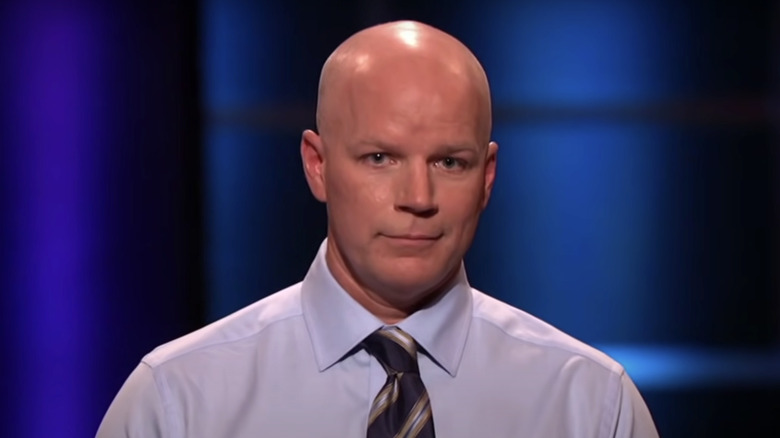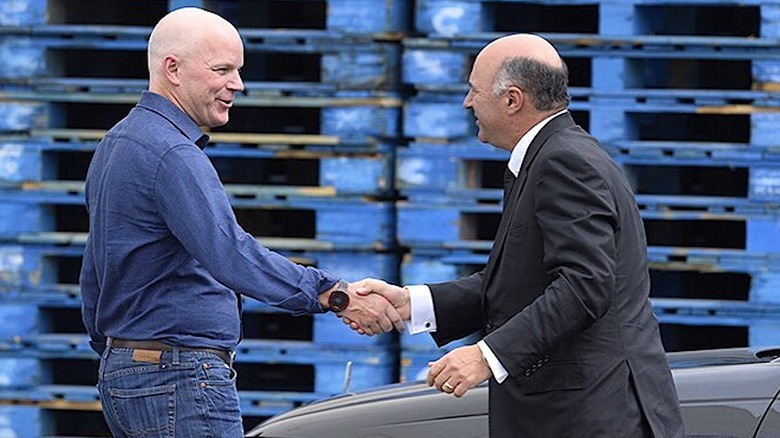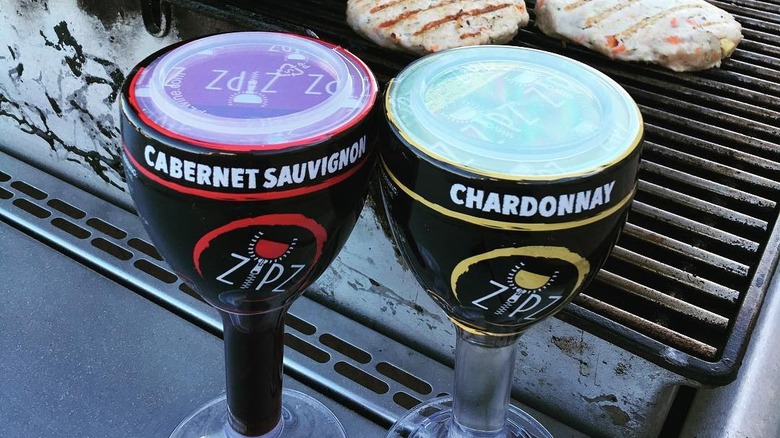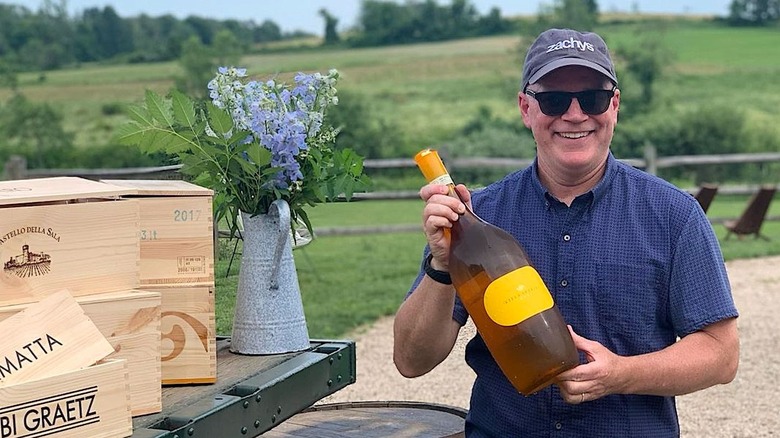Zipz Wine: Here's What Happened After Shark Tank
Single-serve wines have exploded the last few years, with sales of around $483.1 million in 2022, which is expected to grow to $674.9 million over the next decade (via Future Market Insights.) These days, we know that canned wine is ideal for tailgates, barbecues, and other al fresco parties. But back in 2014, when Zipz Wine co-founder Andrew McMurray, who was also the vice president of Zachys Wine & Liquor in Scarsdale, brought his idea to Season 6 of "Shark Tank," single-serve wines had not hit the mainstream in the same way. In part, as with boxed wines, that was due to a perception of their poor shelf life compared with traditional bottles.
Offering a choice of Chardonnay, Pinot Grigio, Cabernet Sauvignon, and Merlot wines, Zipz Wine came in an individual wine glass made from plastic, with shrink-wrap designed to protect the beverage from UV rays, allowing it to be stored for longer without deteriorating. The lid could be screwed on if you hadn't finished the drink, making it more portable, and also acting as a coaster.
In theory, it was a great idea, and one which we know, in hindsight, was about to surge in popularity. But would any of the Sharks want to raise a glass to Zipz Wine?
What happened to Zipz Wine on Shark Tank?
Zipz Wine co-founder Andrew McMurray appeared on "Shark Tank" asking for a $2.5 million dollar investment for a 10% stake in his company, which he founded in 2012. However, the Sharks couldn't help raising the issue of a previous contestant, James Martin, who had already appeared twice on the show, and both times had declined a deal for his seemingly similar invention, Copa Di Vino.
McMurray assured the potential investors that the shelf life of his product, along with the packaging, made it unique. Zipz Wine had sold $650,000 of Zipz brand wine since it started, said McMurray. And the company also had ambitions to supplement its own wine brand with licensing deals, having already made a deal worth $130,000 with Fetzer Vineyards to supply single servings of the wine in six Major League Baseball stadiums across the US.
"Mr. Wonderful" Kevin O'Leary, a wine connoisseur who owned his own vineyard, thought Zipz Wine could be successful, especially if McMurray could get it into Costco. He offered $2.5 million for 10% of the company, with the option to buy another $2.5 million worth of equity at $25 million valuation in the event of an exit. McMurray agreed, and at the time, this was the biggest deal in "Shark Tank" history.
Zipz Wine after Shark Tank
"I've never been so excited about a #SharkTank deal!" investor Kevin O'Leary tweeted after the "Shark Tank" episode aired. Zipz Wine's Andrew McMurray, meanwhile, exclaimed on Instagram that "the wine revolution has begun." Zipz Wine received a huge amount of publicity after the show and aimed to release the wine overseas, including in the U.K., in 2015. O'Leary also revealed plans to put his own wine into the single-serve Zipz cups, and there were plans to team up with liquor companies to produce a range of single-serve cocktails.
In a follow-up appearance on the "Shark Tank" sister program "Beyond the Tank" in 2016, two years after Zipz Wine appeared on the original show, McMurray said that the company had seen a huge increase in sales, and had moved from selling 30,000 cases of own brand wine to around 100,000 cases, anticipating about $1.8 million in revenue.
However, O'Leary appeared frustrated with how slowly things were progressing, even though he still thought the brand had the potential to grow. And the Shark was even more concerned that the company was yet to turn a profit.
Why did Zipz Wine go out of business?
Despite securing a huge deal from "Shark Tank," plus developing some big plans for the future, Zipz Wine went quiet following the "Beyond the Tank" appearance in 2016. The company pivoted to focus on a B2B model rather than B2C, hoping more big names in the wine industry would start to use its packaging. But Zipz Wine hasn't posted on its Instagram account since May 2016, and its website and Facebook account are no longer operational.
The Costco deal that investor Kevin O'Leary was so keen to establish also never materialized, which can't have helped matters. O'Leary told Wine Spectator that he did in fact arrange a meeting with Annette Alvarez-Peters, the head wine buyer at the time for the retail giant, but as she held the single serve glass, "she tipped it ... and it leaked right into her purse."
It is also possible that Zipz Wine failed to keep up with its competitors, in what was to become a fast-growing market. Copa Di Vino, its rival from an earlier "Shark Tank" series, is still in business, despite not securing a deal on the show. This just goes to show that a "Shark Tank" investment does not guarantee success for a business, even if it's one of the biggest deals in the show's history.
What's next for Zipz Wine's founder?
Zipz may no longer be producing its own wine, but as recently as 2019, it seems the company was still licensing its packaging to other drinks manufacturers. And according to his LinkedIn profile, Zipz Wine co-founder Andrew McMurray is still the vice president of Zachys Wine & Liquor, which is a position he has been in for over 30 years. He continues to act as the face of the company, a role confirmed by his biography on X, the platform formerly known as Twitter. He regularly appears in promotional videos for the brand, and hosts events, and wine news announcements, via their social media channels.
In 2022, after 78 years, Zachys moved its primary New York location from Scarsdale to Port Chester, launching a new retail and auction site, as well as storage facilities. The new site regularly hosts tastings as part of its shopping experience, which sometimes raises money for local charities, too.

